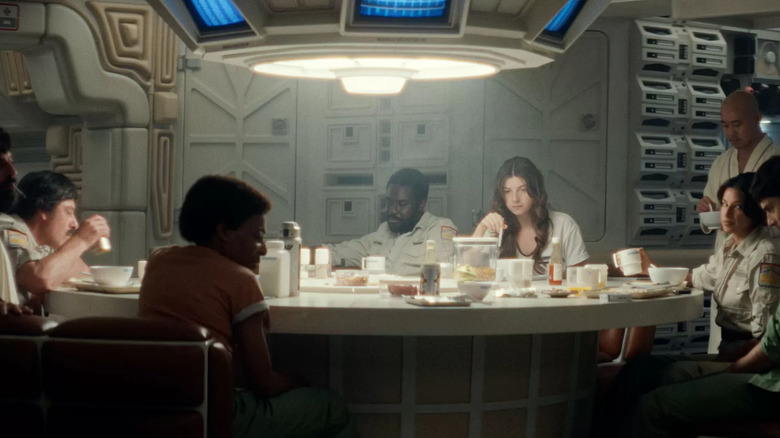Alien: Earth Episode 5 Features A Severance Star You May Have Missed
This post contains spoilers for "Alien: Earth" episode 5.
It's been a good few years for big-budget science fiction on television. Between shows like "Andor," "Foundation," "Star Trek: Strange New Worlds," and "Severance," the genre has thrived, though several of those series are now ending, or recently came to a close. FX's "Alien: Earth" (read our review here) hopes to keep the trend going, and so far, it's a strong contender to enter that same pantheon of 2020s sci-fi bangers. And speaking of "Severance," there's a bit of shared pedigree with that Apple TV+ show that you may have missed in the first episode, and now again in episode 5, "In Space, No One..."
Of course, I'm talking about Karen Aldridge, who plays Weyland-Yutani science officer Chibuzo aboard the Maginot — the ship carrying a menagerie of dangerous aliens back to Earth for research and bioweapons development. Episode 1 shows the ship losing control after a lab breach and crashing into a city ruled by Weyland-Yutani's rival corporation, Prodigy. In episode 5, we go back in time to see the exact chain of events that led to the outbreak, with a lot of material focused specifically on Chibuzo and her experiments on the different alien species.
If she looks familiar, you may have watched "Severance" earlier this year. Aldridge appears in a larger role in that show as Asal Reghabi, the doctor who goes rogue from Lumon Industries and eventually helps Mark Scout (Adam Scott) better understand and take control of the mysterious severance procedure. We'll leave things at that for the sake of dodging "Severance" spoilers, but it's fun to see Aldridge play another sci-fi scientist in "Alien: Earth." Sadly, Chibuzo's fate is a bit more grim than that of Reghabi, but their circumstances as stooges of evil corporate overlords is strikingly similar.
Severance and Alien: Earth actually have a lot in common
Both "Alien: Earth" and "Severance" are interested in the same core ideas: Corporate control in a world where everything — including consciousness — has become privatized, and the dangers of allowing profit-driven systems to take command of your own memories. "Severance" is set in an alternative version of our present day, putting it far earlier on a timeline than the futuristic universe of "Alien: Earth," but it's dealing with the same problems, just developing at an earlier point. Democracy, while technically still intact, is quickly giving way to unchecked corporate authority.
In "Severance," Mark lives in Lumon company housing and has signed roughly half of his life away to the company to do with as it pleases, without him even being allowed to know what his "innie" is being put through at work. It's not so different from the crew of the Maginot, who sacrifice 65 years but only live through a few of them thanks to cryo-stasis, all for a measly quarter share in the company, and all just to be sent back out again when they return.
The corporate plutocracy of cyberpunk, be it in an alternative present or an increasingly likely future, is grim. Perhaps that's why shows like this are resonating so powerfully in this particular moment.

